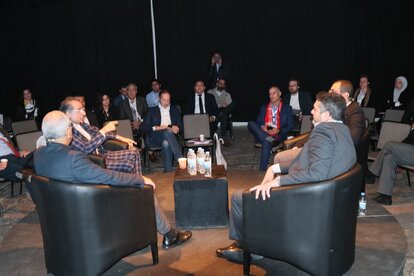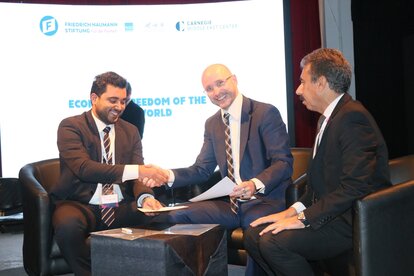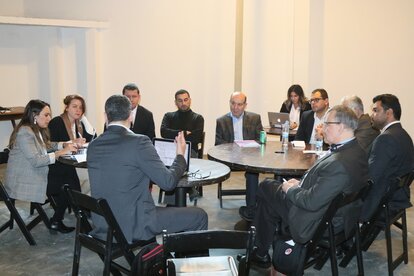Our activities
FNF Economic Freedom of the Arab World Annual Conference
Tens flocked to Station Beirut on 19 December 2019, to partake in the Economic Freedom of the Arab World Annual Conference, held by Friedrich Naumann Stiftung Lebanon and Syria. The conference had diverse panelists, speakers, participants, and organizers coming from different regions in the world. It consisted of 3 main panels, in addition to 2 workshops, and keynote speeches.
The day was kicked off with Dirk Kunze, Regional Director of FNF Middle East and North Africa. Kunze expressed that the values of liberal democracies provide solutions for the challenging economic situation in MENA. Yet, he emphasized on the importance of always linking the numbers to the complex social and political constructs of the region. He added: “this report tells us for example, that in the Arab World, while the size of Government rose in the last 15 years, the Freedom to Trade declined from an already low average. This is not good and even more unfortunate as the Arab world along with sub-Sahara Africa have the least intra-regional trade in the world. So let this fact be a reminder for us to look beyond those numbers and let us also look beyond the way a conference is "usually" being done. Let us look beyond the numbers and discuss the current conflicts, understand the current economic crises around us and let us create scenarios on relevant issues like migration and geo-political interdependencies”.
Fred McMahon, resident fellow Dr. Michael A. Walker Chair of Economic Freedom Research at The Fraser Institute, stated that the Arab world has the lowest level of economic freedom on the planet. He insisted that the only way out is by building a free market economy, a system based on supply and demand with little or no governmental control. “The Arab Spring was largely for better economies, reinforced by the issue of liberties”, he stated.
McMahon insisted that leaders in this region have been using the same economic policies for years, and if this continues, youth unemployment, the remaining hope for the region, will stay on the rise, and this region “can’t afford that, since its rate is already one of the highest in the world,” he noted.
This was followed by a report commentary by Ahmad Ali Hassan, Executive Director of the Secularists Forum for Economy and Development. Hassan said that governments in the Arab region have to be willing to change, just like many countries in Africa have changed their economic models and are living in economic prosperity more than the Arab region. “In a free market, the individuals themselves are freer, because they have more economic and financial freedom,” he insisted.

War, Economy and Politics
The first panel of the day was titled “War, Economy and Politics, the cases of Syria, Yemen, and Libya.” Dr. Mohanad Hage Ali, Director of Communications, Carnegie Middle East Center, said that in conflicts areas and war economies, those who control the borders sit at the negotiating table, even if the ones controlling are not the government. This is what’s currently happening in the Libyan-Tunisian border.
“One of the conflicts in Libya is over who controls the revenues of the oil, and as long as this dispute goes on, the banking crisis will go on, and poverty will increase for the Libyan people,” he said. And although the periods of ending the wars are difficult, since war lords financially benefits from wars and chaos, the country will have a chance to reconstruct the economy, along with the infrastructure, and setting a clear and concise rule of law.
Dr. Mazen Derawan, Syrian Economist, stated that wars don’t always take a negative toll on the economy, on the contrary, he insisted, sometimes they improve it. “Just think of Beirut during the war,” he told the audience, “local shop owners whose shops were previously destroyed would sell their products on the pavements in Raouche. Soon enough, other people joined, and they created other small businesses that were previously absent.”
Derawan also delved into the new economic system that has formed itself during the Syrian war. “During war, profits do not come under normal competitive conditions. The thugs turned businessmen that stemmed from the war and do not have skills that are required for an individual to enter the market,” he stated.
An example of that would be in Northern Idlib, across the Turkish border which is known as a Free Zone economy. “Since the government has no control over the area, and the area is left at the mercy of businessmen and other factions, the economy is less controlled, freer, and thus more profits than usual are made there,” he noted.
Former Yemeni ambassador Mustapha Noman; said that the war in Yemen and the catastrophic banking crisis stopped people from depositing their money in banks, and thus there was less transparency over where people, politicians, and business owners were getting their money from. “The financial system in Yemen cannot be controlled right now, and no customs can be imposed on businesses,” he said.
“To make matters worse, Yemen currently has 2 currencies, and 2 central banks,” Noman said. The one in Sanaa is controlled by the Houthis, and the one in Aden is controlled by the government of Yemen. Each bank considers the other currency as an illegal one. However, 80% of the Yemeni banks are situated in Taizz, a city controlled by Houthis.

Lebanon’s Economic Crisis
The second panel of the day was titled “Why Nations Fail? Lebanon and the Economic Crisis.” Dr. Nassib Ghobril, Chief Economist of the Byblos Bank Group spread hope amongst the audience when he clearly stated that he does not believe that Lebanon is a “failed state.” “The young country has faced many turmoils, and has not implemented its rule of law, when it does; then we can judge its failure or success,” he said.
Yasser Akkaoui, Editor-in-chief of Executive Magazine; believes that Lebanon has failed in basing its economy on principles. “Today we are doing everything in an illegal and unregulated way, and this has to stop if we want to see real progress,” he added.
However, Lebanon is not the first country to pass through such a severe economic crisis. “Greece and Italy have undergone similar economic disasters, and have merged out from them,” Ibrahim Jouhari political analyst and university instructor said.
Lebanon has historically been a safe haven for groups and individuals seeking shelter and freedom in the region, this is what Lebanon has always been based on. “Thus, we need to fix our socioeconomic problems, on the basis of this liberty that Lebanon has always enjoyed,” he said.
Regional Economy
The audience in the conference were then split into two workshops, based on their preferences.
Some opted to participate in “The Geopolitical Economy of the Persian Gulf” workshop while other partook in the “Migration, Interdependency and Euro-Maghreb Economic Relations,” workshop.
The first workshop aimed at shedding light on how the Member states of the Gulf Cooperation Council (GCC) can create more sustainable entrepreneurial projects that can create jobs, and increase income, instead of focusing primarily on oil that is non-renewable. Additionally, participants pointed out the dependency on the public sector that is limiting diversification efforts and called for redirecting government employment to the private sector. Finally, they came up with suggestions to boost GCC economy by supporting initiatives that aims to increase the awareness about entrepreneurship and provides packages of support to entrepreneurs and startups in different stages; rebranding low-income jobs (such as such as garbage collection, gas station labor, sanitation officer); enhancing religious tourism; encouraging food production in Africa; and exploring non-natural resources.
The second workshop toyed with the concept of immigrants who relocate from the Maghreb countries to several European countries, and who at times, face harsh stereotypes. Participants discussed the pros and cons of immigration on both the host and home countries. Some believed that brain drain from Maghreb to Europe is the most alarming, and the harsh stereotypes that some immigrants face in Europe can make it more challenging for them to feel at home in their new destination.

Islam & Freedom
Senior fellow at the Cato Institute’s Center for Global Liberty and Prosperity spoke to the audience via skype about how the Muslim world was freer in the past in a keynote entitled: “The Prospects of Liberty in Islam”. “We have been colonized, intruded, and Arab dictators were supported by the West, all of those factors contributed to the decline of freedom in the Muslim world,” he said. “Europeans used violence in the past in the name of the religion, just like some deviant Muslims are doing today,” he stated.
He also shed light on the hypocrisy being created amongst the Muslim world when enforcing the religion on people, like in Saudi Arabia or Iran for example. “We Muslims sometimes love freedom, but when? When we are minorities being oppressed in India or France only. We need more principled look in this,” he assured.
Moreover, he pointed out that Saudi Arabia imposes the Niqab on women, but the minute they leave the country they take it off, and wear fancy dresses and miniskirts. He also said that in Iran, where alcohol is banned, many have started creating it in their own homes, so alcohol consumption remained in the country.
What’s next?
The final panel of the day was “The Political Economy of the Arab World-Agenda 2020.”
Mustafa Alloush, former Lebanese Member of Parliament, assured the audience that had the Arab Spring not happened, the system itself would have withered and crumpled down. “We need to build new systems in the region, ones built on equity and liberty,” he said.
Fred McMahon, Resident Fellow Dr. Michael A. Walker Chair of Economic Freedom Research at the Fraser Institute, stated that the Arab region needs to first create an environment for a free economy, before real change starts taking place.
“It’s difficult for the Arab World to progress economically when people live off governmental subsidies, however I’m hopeful because of what many are doing in the region to educate the public regarding economic reform,” McMahon concluded.